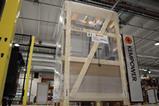IVECO and Shell unite in a effort to showcase the environmental benefits of bioLNG in long-haul transportation. This 10-day journey across Europe aims to prove the viability of bioLNG-powered trucks while the growing role of sustainable fuels in reducing carbon emissions in the freight sector.

Starting at the Mittenwalde Shell station in Berlin, the IVECO S-Way truck will traverse Germany, the Netherlands, and Italy, stopping at key landmarks in the bioLNG ecosystem. The primary objective of this journey is to demonstrate the feasibility of achieving net-zero emissions while maintaining efficient performance.
Each stage of the tour will serve as a platform to convene industry leaders and stakeholders involved in the bioLNG value chain, encompassing production, distribution, and utilisation. These discussions will revolve around the profitable use of bioLNG in decarbonising road freight transport.
This collaborative endeavor underscores the strategic partnership and policy leadership driving the adoption of bioLNG in the European fleet market, with a specific focus on raising awareness regarding its decarbonisation potential for long-haul transport. The transport sector currently shoulders a significant responsibility, accounting for approximately 9% of total EU CO2 emissions, with around 73.1% of all land-based freight transport taking place within the European Union.
Giandomenico Fioretti further explained, “We aim to position bioLNG as a growing energy source in the European transport market. Together, we will contribute to the industry’s transition towards a net-zero-carbon future.”
Beyond long-haul missions, IVECO’s bioLNG-powered trucks offer quieter operation compared to conventional internal combustion engines, making them well-suited for urban applications and nighttime deliveries while enhancing driver comfort. BioLNG’s compatibility with the existing LNG infrastructure, which comprises 668 stations across the EU, enables its use as a drop-in fuel for LNG-powered trucks without requiring equipment modifications or new investments. This flexibility positions bioLNG as a viable solution for decarbonising fleets.


















